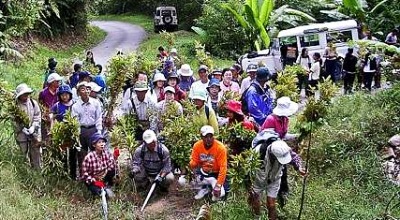Saturday March 27, 2010
Cameron Highlands has been experiencing accelerated growth, especially over the past two decades that, while beneficial to the local economy, is threatening the area with environmental degradation.
Part of this can be attributed to poor planning and enforcement.
Landslides, silted rivers and dams, constant water disruptions and poor water quality have become common issues in this picturesque highland retreat.
Alarmed by the rapidly deteriorating environment, especially the declining water quality and deforestation, a group of Cameron Highlands residents decided to form Regional Environmental Awareness Cameron Highlands or REACH in 2001.

Giving Mother Nature a hand: REACH volunteers planting tree saplings to counter deforestation in Cameron Highlands
"It all began back in 2000 when laboratory testings confirmed the presence of E. coli, a bacterium that’s a health hazard, in our treated drinking water," says REACH president Ramakrishnan Ramasamy, 45.
"As there were farms located above the water catchment areas, we collected water samples and did further tests. We were shocked to find that not only did they show presence of animal faeces, there was human waste as well due to the lack of proper sanitation by farm workers!
"The authorities promised to shut down the 68 farms but till now, nothing much has been done. We have no problems with farming but we are concerned when the farms are located above the water catchment areas," he adds.
REACH reports that 97% of Earth’s water is salty or otherwise undrinkable and almost 3% is locked away in ice caps and glaciers or deep underground. It is estimated that only 0.003% is actually available for use. Mountain areas are the main sources for fresh water, and so must be protected.
REACH is also worried about recent findings that show the presence of DDT in the rivers, a synthetic pesticide for controlling malaria that is banned in most developed countries.
"As DDT is banned in Malaysia, we suspect that it is smuggled from neighbouring countries and mixed into local pesticides. It has a half-life of up to 100 years, which is very detrimental to the environment and our health in the long run. We will publish a full report when we have compiled more facts," says Ramakrishnan.
Besides highlighting the water issues in Cameron Highlands, REACH’s other two core concerns are reforestation and recycling.
"We are working with the foresty department, corporate companies and organisations on an on-going project to reforest a 17ha site at Hulu Bertam Forest Reserve, Gunung Brinchang.
"Planting endemic tree saplings ensures that the original biodiversity of the area is retained," explains Ramakrishnan.
Their recycling project has also gained momentum due to overwhelming response from the community.
"We have set up many collection centres all across town and we have a compactor site where recyclables are compacted to facilitate easier transportation to factories in Ipoh and Kuala Lumpur," reveals Ramakrishnan.
Many hotels and schools in Cameron Highlands are already involved in the programme, encouraging recycling via buy-back schemes and creating awareness through talks.
REACH published Wild Orchids Of Cameron Highlands last year, a coffeetable book featuring the 630 wild orchid species of Cameron Highlands.
"Our committee took eight years to work on this book. Plans are also afoot to set up a wild orchid sanctuary to house wild orchids confiscated from poachers," he says.
REACH is run by a group of volunteers with funds from membership, donations, small grants, reforestation activities and sales of souvenirs. Visit www.reach.org.my to become a volunteer or for more details.
No comments:
Post a Comment